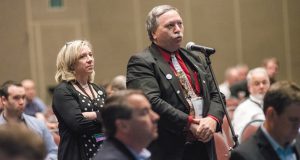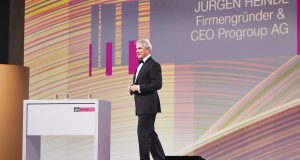ZENAIDE PERES
To support the development and growth of the paper and pulp industry, while securing positive returns on invested capital—that is the vision of Suzano CEO Walter Schalka, who recently won RISI’s Latin American CEO of the Year Award for an unprecedented third consecutive time.

Data: 30/03/2016
Local: Itararé – SP
Cliente: Suzano
Ref1: Florestal
Ref2: Itararé – SP
Job: Itararé – 30/03/16
Assunto: área de preservação e floresta de eucalipto na Fazenda Ibiti – Unidade da Suzano em Itararé – SP
Fotógrafo: Sérgio Zacchi
According to Schalka, his management model focuses on dialogue and teamwork. For him, all people in the organization are relevant in the value creation process, which should be much more collective than individual.
Suzano has a 93-year history of operating in the pulp and paper industry. It now has five industrial units in Brazil: Suzano, Rio Verde, and Limeira in São Paulo state; Mucuri in Bahia state; and Imperatriz in Maranhão state. The company has an annual capacity of 4.7 million mtpy of pulp and paper. Suzano will soon start up two new tissue paper machines at existing mills in Brazil.
Suzano also operates in the biotechnology sector through FuturaGene, the first company in the world to obtain approval for the use of genetically modified eucalyptus. The company has recently started to produce and sell fluff pulp and lignin, a sub-product of the pulp production process that can be a substitute for oil in high value applications.
RISI: How has Suzano been seeking to reinvent itself to generate more value?
Schalka: The concept of our company is to constantly analyze each step we take, always asking: how can we do things differently, how can we do better? We look for the answers internally at our mills, but also externally observing other companies. Sometimes it is not a competitor; it can be a company from a completely different industry. This attitude brings positive impacts on financial results.
Because of that attitude, Suzano’s return on invested capital (ROIC) has improved. We demystified the concept that says the EBTIDA were the correct criteria in evaluating a company in our industry, which is capital intensive. The right concept to consider is EBITDA minus sustaining Capex, divided by the asset base.
We don’t wish that only our return increases, but that the whole industry’s return grows as well. I’m not the type who likes to screw up the big player. I would prefer an industry where I earn eight and my competitor earns nine, to an

Data: 11/04/2016
Local: Imperatriz – MA
Cliente: Suzano
Ref1: Industrial
Ref2: Imperatriz – MA
Job: Imperatriz – 11/04/16
Assunto: Vista aérea da fábrica da Suzano em Impretriz – MA.
Fotógrafo: Sérgio Zacchi
industry where I earn three and my competitor earns two. I want a healthier industry, where players have a recurring return on capital employed, which is not what has been happening in the past 20 years.
Since you took over Suzano’s leadership, your management model has been focusing on dialogue and teamwork. Do you think these are some of the reasons that led you to earn this award for the third consecutive time?
My award is a product of Suzano’s financial results, it’s not about me. It’s about 8,000 people. The great virtue of Suzano is to give people space for exercising their knowledge, leadership, and emotion. And this work has made people feel engaged and motivated, thus bringing new solutions to the company. There is no area where the company is not developing. It’s because we generate a virtuous circle where we have better results and happier, more motivated people bringing new ideas to all areas. Of course, motivated people will bring projects that create more value for the company, for the industry. I think Suzano’s results stem from that.
Suzano’s employees can exercise their full potential through many initiatives. Meritocracy is one of them. We believe that people need to grow according to their personal effort on one hand, but also with their personal development on the other. This combination naturally creates opportunities for career growth. I strongly believe that this model is what allows everyone to be happier.
If all business units are performing simultaneously, there will be a set of initiatives to improve the company, but not only to generate more profit. We believe that people’s work helps achieve better results for the company, such as productivity gains, but also affects people’s lives, the communities we work in, mitigating impacts on the environment, for example. So, the set of responsibilities that we have is much larger and we need to understand this vision of our role within society in a more comprehensive way.
Suzano has also been going through a cultural change from “owner” to the current model with decentralized power. Is this working?
Today we have more power in the corners, disintermediation of processes and greater proximity to the various stakeholders. In my opinion, it is the model of the future. Any change is a process. The company came from an experience of owner-company and then CEO-company, more centralizing where the decision process was in few people’s hands.
We want to spread this decision process throughout the organization. We do not believe in job description, we believe that people have a much broader responsibility than simply following a determination that comes from the boss. This creates maturity and it is wonderful because people with more personal and professional maturity end up making better decisions and working better. This is the main engine of the change process that Suzano has been undergoing.
What is the secret for constant development? Has the company already reached the potential you wanted?
We make some mistakes, but we score many times more. And the fact that we’re scoring more than making mistakes is what drives the company’s development. The errors are not considered a fault; it is about apprenticeship. We always seek to look to the future, not to look in the rearview mirror. You have to look ahead and see what you will do differently tomorrow.
The company will never get where I want, because the day it gets there, my cycle will be over. The day that I find that my impact on the organization and its process of transformation are not important anymore, it makes no sense for me to remain here. So I will never cross the finish line; no company will, because there is no perfect company. We must demonstrate that we need to be better than ourselves every day. There is a group of people in every organization that criticizes the mistakes. Great, let’s bring up the problems—but help me find the solutions. Then we will be better.
The company can only keep the cash cost nominally decreasing due to initiatives that are being taken over time. Today’s cash cost is the work of one, two years ago. It is the fruit of investments and gains in efficiency in the forest and the mills that began years ago. We are planting today seedlings that we will be harvesting in two to three years, so we have to think how we will reach the goals that we want to reach in two or three years.
How does Suzano see itself in the next few years? What do you see for the industry of the future?
When we started the Suzano Pulp Program, which consists of spreading our customer base, we were criticized because this initiative would increase costs to the company. However, today the program has many more customers and the cost to reach these customers is lower. This is because of a series of actions we have taken, such as the introduction of electronic systems that now make it possible to order online.
We believe that all concepts of industry 4.0 and cognitive intelligence are naturally changing the way we are. We are discussing today how we will do forestry in the future. How will forestry of the future be done—with autonomous vehicles, satellite systems to track the growth of trees, or drones to measure trees? How are we going to reduce the impacts of fire risks using the camera systems available in the forests? I am giving examples of things we are working on now, but the result will come in two or three years.
What are Suzano’s plans for expanding forests and mitigating the impacts on the environment?
We are increasing our forest base in both Bahia and Maranhão states, and we want to simultaneously expand the base while reducing the average radius. The goal is to reduce the average radius, and with this we gain multiple benefits such as falling costs and falling CO2 emissions.
In the last four years we have modified the entire collection and recycling system with the acquisition of extremely modern machines, which will also reduce the impact on the environment. Suzano is constantly analyzing every step of every process and reinventing itself. What can we do differently? How can we do better? From these questions we will look internally at our other factors, but also look externally. Who does it best?
What should pulp and paper producers do to stay competitive?
The origin of our competitiveness in Brazil comes from the fiber, from the forest, so we need to think about how we are going to use this forest better than we have used it so far.
An alternative is to use and consume a part of the forest in chemicals; lignin is one example that we are doing. Another example is to use other types of fiber, such as fluff. In addition, there are people in our industry looking for dissolving pulp. It’s an interesting initiative because this is going to be the future of the clothing market. The dissolving pulp becomes viscose, which will be an increasingly important product for the clothing market. It can replace the cotton that generates a mega-environmental impact. The consumption of water in cotton production is gigantic.
Initiatives to leverage forest use much more intensely and with far more quality than we have done so far are critical for the future.
What stage have you reached with Suzano’s new projects?
The first is FuturaGene (a biotechnology research company focused on forestry improvement). The scientific part is on schedule; the issue is with the FSC, so we decided to change the term “transgenic” because it sounds like something dirty or wrong. The new name is “sustainable engineering trees”: SET. These engineered trees are improving on the scientific side, but we are not doing commercial deployments yet because of FSC’s limitation. The product is ready, we have several others to put in place, and we are developing others.
The second business is eucalyptus fluff pulp, and we need to go back 60 years to talk about it. When Brazil—or Suzano—started to produce paper and pulp in 1956, competitors stated that those products were not good and had poor quality. At the time, the product was in development, and it was necessary to adapt the machines to handle eucalyptus. Today, more than 55 percent of the global pulp market is short fiber.
In my opinion, the same is going to happen with fluff. Competitors say it is no good, that the absorption of fluff is worse than long fiber. Suzano is perfecting the product and showing customers that diaper or absorbent products for women are getting better with short fiber than with long fiber. This leads to greater acceptance and a consequent increase in sales volume. Every quarter we are hitting record sales. We are selling fluff pulp to Brazil, the US, Europe, and China.
For female absorbents and geriatric diapers, the product is doing well. For infant diapers, we need to further develop the product. We believed we would replace 40 percent of softwood, but we are getting between 20 and 25 percent. I am convinced that in 10 years the fluff market will account for 40 to 50 percent of the global hardwood market.
The third business I can mention is lignin. Lignin sales are expected to start in the second quarter of 2018. We are behind schedule on the project, but on purpose. By design, we decided to revisit the entire commercial and technical aspects so as not to have risk at the start. The equipment is already in Limeira and everything is right.
Zenaide Peres is associate editor, Latin America paper and pulp, for RISI. She is based in São Paulo, Brazil.
Walter Schalka, CEO, Suzano.
Suzano manages 1.2 million hectares of eucalyptus, of which 520 thousand hectares are planted forests (owned, rented, or subsidized). About 488 thousand hectares are set aside as preservation areas.
Suzano’s Imperatriz mill produces 1.5 million mtpy of pulp. The new tissue line at Imperatriz is slated to come online in the third quarter of 2017, with expected production capacity of 60,000 mtpy.
 Paper 360
Paper 360


